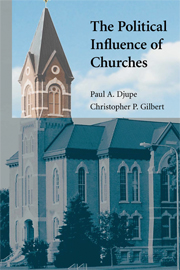Book contents
- Frontmatter
- Contents
- Acknowledgments
- Introduction: A Theory of Religious Influence on Political Behavior
- 1 Social Networks and Church Structure
- 2 Clergy Influences and Religious Commitment Reconsidered
- 3 Church-Centered Influences on Public Opinion
- 4 The Resourceful Believer
- 5 The Construction of Political Mobilization in Churches
- 6 Present but Not Accounted for?
- 7 Conclusion
- Appendix: Variable Coding
- References
- Index
Introduction: A Theory of Religious Influence on Political Behavior
Published online by Cambridge University Press: 05 June 2012
- Frontmatter
- Contents
- Acknowledgments
- Introduction: A Theory of Religious Influence on Political Behavior
- 1 Social Networks and Church Structure
- 2 Clergy Influences and Religious Commitment Reconsidered
- 3 Church-Centered Influences on Public Opinion
- 4 The Resourceful Believer
- 5 The Construction of Political Mobilization in Churches
- 6 Present but Not Accounted for?
- 7 Conclusion
- Appendix: Variable Coding
- References
- Index
Summary
americans have always formed and joined associations devoted to every imaginable purpose, whether social, cultural, recreational, religious, or political. These tangible expressions of Americans' seemingly endless capacity for associational life have motivated scholarly inquiries since the early days of the republic. Thoughtful observers of American politics have contributed immensely to this literature, understanding that group activism models the conditions in which democratic forms of government may flourish. After observing the myriad forms of associational life throughout his travels in the early nineteenth-century United States, Tocqueville vested associations with the capacity to protect freedom from encroachment: “If each citizen did not learn … to combine with his fellow citizens for the purpose of defending [his freedom], it is clear that tyranny would unavoidably increase together with its equality” (1994: 106). More than a century later, David Truman asserted that associations are essential to ensure the freedom to act, linking the modern American forms of group life to the classical ideals of Aristotle: people “must exist in society in order to manifest those capacities and accomplishments that distinguish them from the other animals” (1951: 14).
From the insights of Tocqueville, to the findings of the early behavioralist literature in the mid-twentieth century (Berelson, Lazarsfeld, and McPhee 1954; Dewey 1927; Lenski 1961; Truman 1951), through the sophisticated empirical analyses of leading contemporary social scientists (Huckfeldt and Sprague 1995; Putnam 2000; Zuckerman 2005), one central insight recurs: group membership has political consequences.
- Type
- Chapter
- Information
- The Political Influence of Churches , pp. 1 - 20Publisher: Cambridge University PressPrint publication year: 2008

